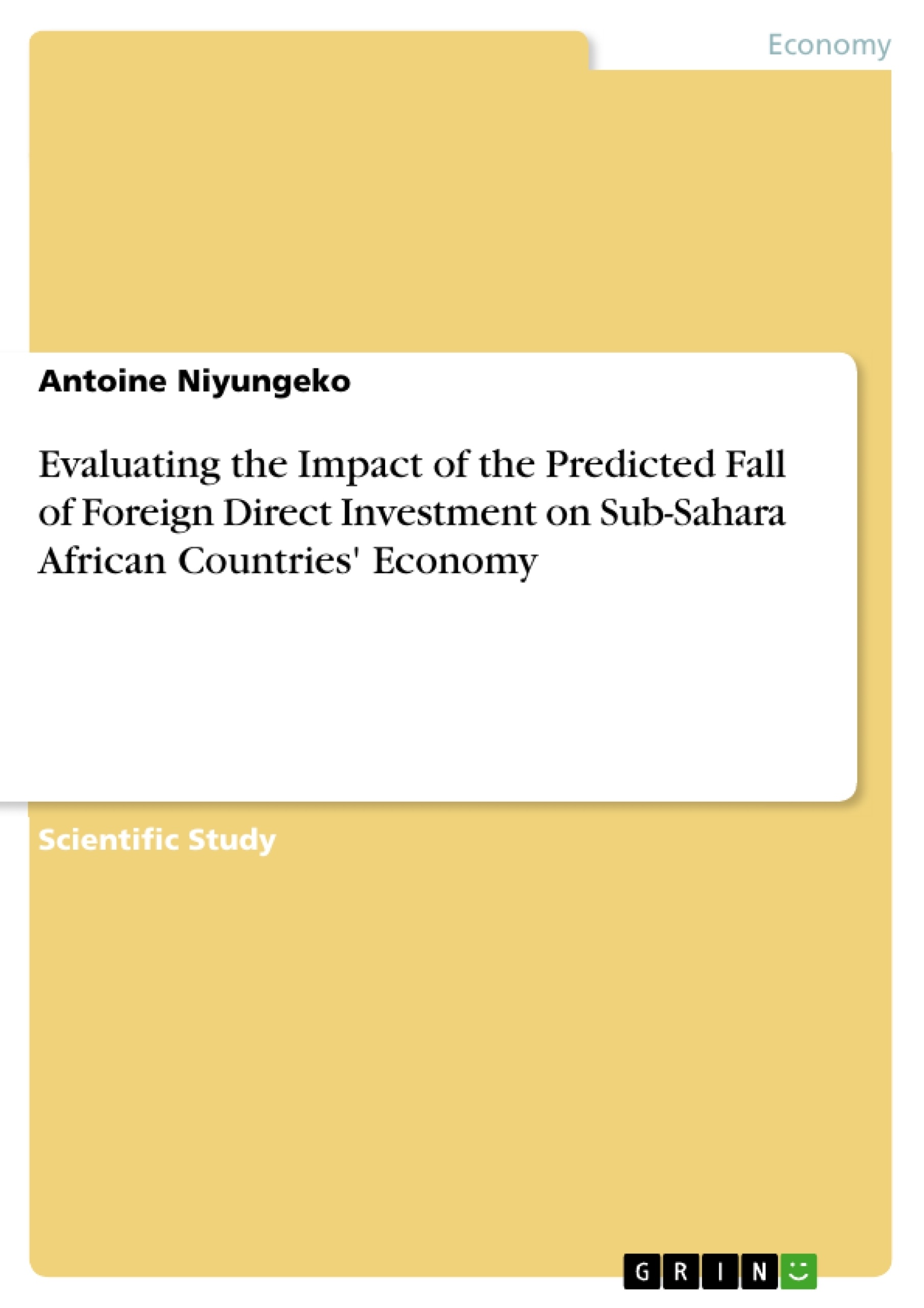The paper investigates what may be the impact of the predicted fall of FDI on GDP in SSA. The United Nations Conference on Trade and Development (2019) indicated that FDI flows to Africa increased by 11 percent to $46 billion, despite declines in many of the larger recipient countries. The increasing of FDI flows was justified by continued resource-seeking inflows, some diversified investments, and a recovery in South Africa after several years of low-level inflows.
However, the predictions of 2020 regarding FDI flows are dramatic. Compared to 2019, global flows of FDI are expected to decrease by up 40 percent from their value $1.5 trillion in 2020 as a result of the COVID-19 pandemic (United Nations Conference on Trade and Development, 2020). This organization predicted a fall of FDI to reach -45 to -30 in Europe, North America -35 to -20, -40 to -25 in Africa, -45 to -30 in Asia, Latin America and the Caribbean -55 to – 40, and in transition economies -45 to -30. The prediction for Africa of a 25-40 percent decline is based on GDP growth projections as well as a range of investment-specific factors. The same organization indicated a decline in GDP growth for Africa from 3.2 per cent to -2.8 percent. The primary goal of this study is to investigate the relationship between FDI and GDP through import (IMP), export (EXP), gross capital formation (GCF), and household consumption (HHC), and government expenses (GEXP).
Specifically, the study tends to address the following sub-objectives: Analyzing the relationship between FDI-GDP-HHC-GEXP-GCF-EXP-IMP. Analyzing direct, and indirect impact of FDI on GDP for 40 SSA altogether. Investigating the impact of FDI on GDP in SSA countries whose FDI is under median on one hand, and SSA countries whose FDI is greater than median, on the other hand. Finally, comparing the impact of FDI on GDP in 12 SSA with highest and lowest FDI.
Inhaltsverzeichnis (Table of Contents)
- INTRODUCTION
- LITERATURE REVIEW.
- DATA METHODOLOGY.
- Data.....
- Data analysis...........
- EMPIRICAL RESULTS AND DISCUSSION .
- DESCRIPTIVE STATISTICS…………………………….
- Correlation and regression results.
- Direct and indirect effects analysis.....
- CONCLUSION AND POLICY IMPLICATIONS.
- REFERENCE....
Zielsetzung und Themenschwerpunkte (Objectives and Key Themes)
This study aims to analyze the relationship between foreign direct investment (FDI) and key components of GDP in Sub-Saharan Africa (SSA) countries, specifically household consumption (HHC), government expenses (GEXP), gross capital formation (GCF), exports (EXP), and imports (IMP). The study also aims to evaluate the potential impact of the predicted fall in FDI on GDP in these countries.
- The relationship between FDI and key components of GDP in SSA countries.
- The impact of the predicted fall in FDI on GDP in SSA countries.
- The influence of FDI on economic growth in host countries.
- The potential consequences of the decline in FDI on various economic variables.
- The role of FDI in contributing to GDP growth.
Zusammenfassung der Kapitel (Chapter Summaries)
The introduction of the paper explores the predicted fall in foreign direct investment (FDI) for Africa and its potential impact on GDP in Sub-Saharan Africa (SSA). The literature review provides a comprehensive overview of existing research on the relationship between FDI and economic growth, highlighting the mixed results found in empirical studies. The methodology section details the data collection process and the statistical methods employed in the analysis. This includes descriptive statistics, correlation and regression analysis, as well as direct and indirect effects analysis. The results and discussion section presents the findings of the study, focusing on the correlation between FDI and key components of GDP, and the impact of FDI on GDP in SSA countries.
Schlüsselwörter (Keywords)
The study focuses on the impact of the predicted fall of foreign direct investment (FDI) on gross domestic product (GDP) in Sub-Saharan Africa (SSA) countries. The study examines the relationship between FDI and key components of GDP, including household consumption (HHC), government expenses (GEXP), gross capital formation (GCF), exports (EXP), and imports (IMP). The study further explores the potential consequences of the decline in FDI on various economic variables in SSA.
Frequently Asked Questions
What is the predicted impact of COVID-19 on FDI in Africa?
Global FDI flows were predicted to decrease by 25-40% in Africa in 2020 due to the pandemic and related economic factors.
How does FDI relate to a country's GDP?
FDI influences GDP through various components including household consumption (HHC), government expenses (GEXP), gross capital formation (GCF), and trade (exports/imports).
What are "resource-seeking inflows"?
These are investments made by foreign companies specifically to access and exploit natural resources available in the host country, common in many SSA nations.
Which variables were analyzed in the SSA study?
The study examined FDI, GDP, household consumption, government spending, capital formation, and export/import data for 40 Sub-Saharan African countries.
Does FDI always lead to economic growth?
Empirical results are often mixed; the study investigates both direct and indirect impacts to clarify this relationship in the context of Sub-Saharan Africa.
- Citar trabajo
- Antoine Niyungeko (Autor), 2020, Evaluating the Impact of the Predicted Fall of Foreign Direct Investment on Sub-Sahara African Countries' Economy, Múnich, GRIN Verlag, https://www.grin.com/document/915437



